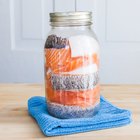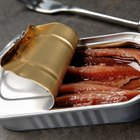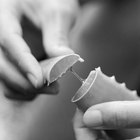AD077/iStock/GettyImages
Most foods sold in packages for consumer use have some kind of freshness date or "best before" date imprinted on them. These dates are intended to help retailers rotate their stock and guide consumers in assessing their freshness. That's rather important with highly perishable foods such as fish fillets, but the date on a can of beets is relatively flexible. While the fish quickly becomes inedible or even dangerous, the beets can be eaten for years past their recommended date.
It Doesn't Really Expire
Modern canned goods are about the most durable processed foods imaginable. The cans are lined with non-reactive materials to prevent unfortunate reactions with the foods, so as long as they remain safely sealed, the food inside should remain free of dangerous bacteria or toxins. The key to successful long-term storage of canned goods is to control the environment in which they're stored. They should be kept in a dry, well-ventilated storage area, where they won't be exposed to moisture, humidity, physical damage or extremes of temperature.
Keep the Beets
Fresh beets are a long-keeping vegetable in their own right, but they require extended cooking time and are prone to staining your clothes and fingers. It's much more convenient to keep a few cans around, so you have the option of enjoying them quickly when you have the inclination. They're sold sliced, diced and whole, either plain, pickled or occasionally in sauce, as Harvard beets or similar preparations. Each version can last for years, though there's some variation between them.
Storage Life
Cans are a durable enough storage medium to keep your beets food-safe for a number of years, but their quality will deteriorate over time. Pickled beets or beets in sauce, with their relatively high levels of acidity, are usually best consumed within the first 12 to 18 months. Regular beets packed in lightly salted water are more stable, and like other low-acid foods, they retain their quality for three to five years under good storage conditions. Outside of those recommended storage times they'll usually remain edible, but they might lose their firm texture and sweet earthiness.
When to Say No
You'll still need to exercise some judgment every time you open a can, just to be safe. Most cans are still usable if they're dented, but be wary of cans with a sharp dent or a dent along one of its seams. Cans with visible signs of rust or water damage are also suspect, and they might have lost their seal. Discard them without tasting the beets inside. Any swollen cans should also be discarded, as well as cans that spray beet juice or smell fermented once they're opened. These are infallible signs of a damaged can with fermented contents.
Related Articles
How Long After the Expiration Date Can ...
How Long Can You Keep Canned Salmon?
How Long Can Food Stored in Canning ...
How Long Are Canned Meat & Vegetables ...

Can You Freeze Canned Goods?

Dented Cans and Botulism

How to Can Salmon Fish

Does Canned Soup Go Bad?

How to Know If Pork Chops Have Gone Bad
How to Preserve Salsa Made With Canned ...

What Are the Best Containers to Freeze ...

How Long Is Pork Good for While Frozen?

How to Store Opened Anchovies

Shelf Life of Frozen Foods

Problems With Black on Canning Jar Rim

How Long Can Cooked Salmon Last ...

How Popcorn Storage Affects Popping

How Long Does Aloe Vera Juice Last in ...
Do Sardines Ever Go Bad?
Maximum Storage Temperature of Canned ...
References
Writer Bio
Fred Decker is a trained chef and prolific freelance writer. In previous careers, he sold insurance and mutual funds, and was a longtime retailer. He was educated at Memorial University of Newfoundland and the Northern Alberta Institute of Technology. His articles have appeared on numerous home and garden sites including GoneOutdoors, TheNest and eHow.